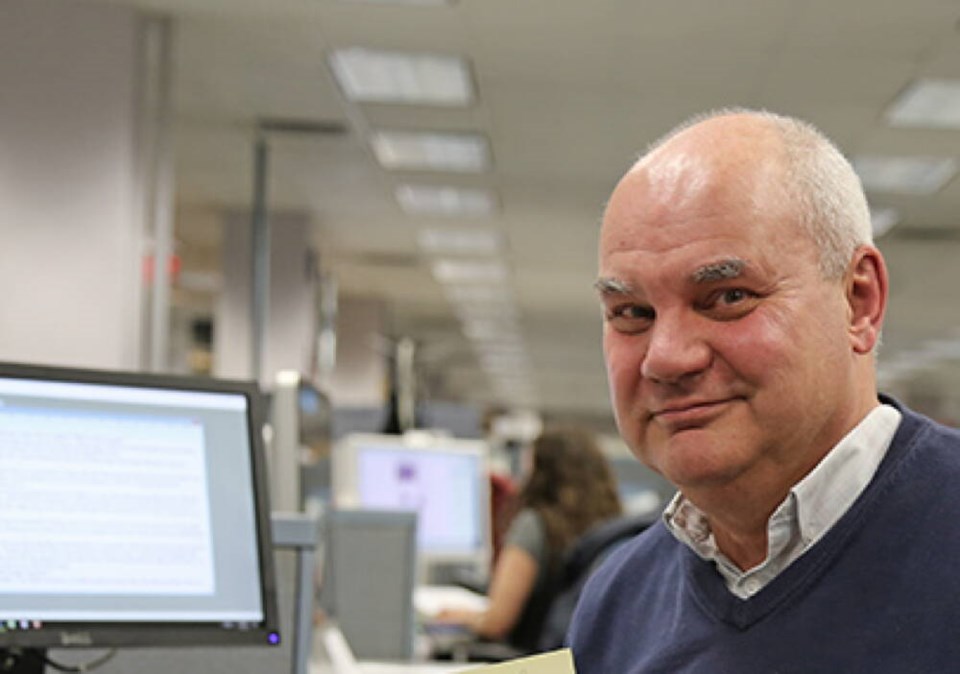Long ago, on my first day at the Times Colonist, I was toured around the building by an editor who cheerfully pointed out places where people had had sex. The cot in the first aid room made sense, but the stairwell just looked painful.
As it turned out, no such perks were on offer — at least to me — by the time I first climbed those stairs, though employees did get half-price newspaper subscriptions.
The TC was still a fun place to work. I had a boss who, after a tough day, would kick another dent into my already-dented pick-up truck. We had a switchboard operator who twice lit her purse on fire while trying to sneak a smoke. Once, in the wee hours of the morning, the night crew gathered in the parking lot to watch two guys settle a you’re-fatter-than-I-am argument with a foot race.
I spent my first seven years working nights, which is when a lot of the weird stuff happened. On one occasion, all alone in the newsroom at 1 a.m., I looked up to find a man whose coat was festooned in school track-meet ribbons. He had popped by, he said, to divulge the seven top-secret secrets of the world, one of which was that Britain and the Soviet Union had engaged in a nuclear-weapon-testing competition that had knocked the Earth off its axis so badly that ships could no longer navigate by the stars. “I think what you have is more of a visual story,” I told him. “CHEK television is right next door.” Sorry, CHEK.
One day, just for fun, I wrote an (attempted) humour column, which eventually morphed into a full-time job. That was more than 4,000 columns ago — way too many for one particularly distraught reader who would periodically send letters imploring me to please, please, please stop writing. I haven’t heard from him in a while, but hope he will be comforted to learn that he’ll no longer have to endure me that often. It’s time to scale back. This is my last regularly scheduled column, though you’ll still hear from me when the spirit moves me.
Damn, but I have been in an awfully privileged position for an awfully long time, though. I have been tasered (voluntarily), gone paragliding off a cliff (screaming like a little girl), been blasted with blowhole spray by Luna the whale (it tasted like fish) and swapped dance moves with the last peeler on the pole at Monty’s.
Barack Obama phoned me four days before being elected president, which was cool, though in truth the famous people were never as interesting as the seemingly ordinary ones with extraordinary stories to tell: the last guy on Earth to speak his language, another whose philanthropy grew out of surviving the Nagasaki nuclear bomb, another who used to go for milk and cookies at Adolf Hitler’s house, the sweet-natured woman who caught the Millennium Bomber, a fellow who faked the last name in the phone book.
Along the way, I got to work with some top-notch journalists. Lindsay Kines and Les Leyne picked up the Michener Award, the greatest honour in Canadian journalism, on behalf of a Times Colonist team that won for its reporting on the B.C. government’s treatment of people with developmental disabilities. Another TC team earned a Michener nomination for a series on the grim state of Indigenous housing on Vancouver Island.
Debra Brash, Iain Hunter and Roger White all won National Newspaper Awards. In the past decade, other Times Colonist NNA nominees included Leyne, Amy Smart, Katie DeRosa, Darren Stone, Sarah Petrescu, Lyle Stafford and Louise Dickson, who has piled up three nominations in the past six years. Cleve Dheensaw was inducted into the B.C. Sports Hall of Fame. Dave Obee won the Bill Good Award for his contribution to journalism.
This matters because quality journalism matters. There’s no substitute for real reporters doing real legwork, producing credible pieces that don’t get published without first passing the scrutiny of a real editor.
Local journalism is important. It’s where we build community; think of a neighbourhood pub where people from different backgrounds gather to talk about what they have in common and what sets them apart, to share unconsidered opinion and unexpected perspective. It’s where we work things out.
That’s threatened, though. The information age was supposed to broaden our vision, but in practice it has narrowed it. Online, we tend to lock ourselves into silos, choosing information sources that reflect and harden our views. Instead of a diversity of voices, all we hear are our own echoes.
Traditional media sources — whether in print, television, radio or online — have been hollowed out in recent years, weakened not because of a decline in a desire for news but because much of the advertising revenue that pays the bills has gone elsewhere. In their place, as the line between journalism and activism blurs, your social media feed is littered with sites where the news is shaped by somebody’s agenda, presented from a monotheistic view.
All of which is a long, roundabout way of saying thanks to you, the reader, for supporting local journalism, and for allowing me to enjoy my privileged position for all those years.
>>> To comment on this article, write a letter to the editor: [email protected]




